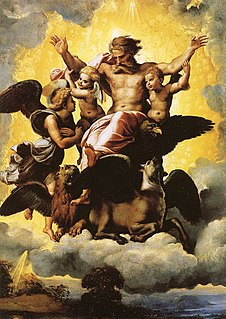 W
WThe English word god comes from the Old English god, which itself is derived from the Proto-Germanic *ǥuđán. Its cognates in other Germanic languages include guþ, gudis, guð, god, and got.
 W
WThere are various names of God, many of which enumerate the various qualities of a Supreme Being. The English word god is used by multiple religions as a noun or name to refer to different deities, or specifically to the Supreme Being, as denoted in English by the capitalized and uncapitalized terms God and god. Ancient cognate equivalents for the biblical Hebrew Elohim, one of the most common names of God in the Bible, include proto-Semitic El, biblical Aramaic Elah, and Arabic 'ilah. The personal or proper name for God in many of these languages may either be distinguished from such attributes, or homonymic. For example, in Judaism the tetragrammaton is sometimes related to the ancient Hebrew ehyeh. In the Hebrew Bible, YHWH, the personal name of God, is revealed directly to Moses. Correlation between various theories and interpretation of the name of "the one God", used to signify a monotheistic or ultimate Supreme Being from which all other divine attributes derive, has been a subject of ecumenical discourse between Eastern and Western scholars for over two centuries. In Christian theology the word is considered a personal and a proper name of God. On the other hand, the names of God in a different tradition are sometimes referred to by symbols. The question whether divine names used by different religions are equivalent has been raised and analyzed.
 W
WAllah is the common Arabic word for God. In the English language, the word generally refers to God in Islam. The word is thought to be derived by contraction from al-ilāh, which means "the god", and is linguistically related to El (Elohim) and Elah, the Hebrew and Aramaic words for God.
 W
WIn ancient Tagalog indigenous religion, Bathala Maykapal is the transcendent Supreme Being; the originator and ruler of universe. He is commonly known and referred to as Bathala; a term or title which, in the earlier times, also applied to lesser beings such as personal tutelary spirits, omen birds called tigmamanuquin (tigmamanukin), the mountain which is the abode of said omen birds, comets, and other heavenly bodies which the early Tagalog people believed predicted events. It was after the arrival of the Spanish missionaries in the Philippines in the 16th century that Bathala Maykapal came to be identified as the Christian God, thus its synonymy with Diyos. In the course of the 19th century, the term Bathala was no longer in use when it was totally replaced by Panginoon (Lord) and Diyos (God) until it was popularized again by Filipinos who learned it from Chronicles that the Tagalog God was called Bathala.
 W
WGitche Manitou means "Great Spirit" in several Algonquian languages. Christian missionaries have translated God as Gitche Manitou in scriptures and prayers in the Algonquian languages.
 W
WGod the Father is a title given to God in various religions, most prominently in Christianity. In mainstream trinitarian Christianity, God the Father is regarded as the first person of the Trinity, followed by the second person, God the Son, and the third person, God the Holy Spirit. Since the second century, Christian creeds included affirmation of belief in "God the Father (Almighty)", primarily as his capacity as "Father and creator of the universe".
 W
WShangdi, also written simply, "Emperor", is the Chinese term for "Supreme Deity" or "Highest Deity" in the theology of the classical texts, especially deriving from Shang theology and finding an equivalent in the later Tian of Zhou theology.
 W
WTiān (天) is one of the oldest Chinese terms for heaven and a key concept in Chinese mythology, philosophy, and religion. During the Shang dynasty, the Chinese referred to their supreme god as Shàngdì or Dì (帝,"Lord"). During the following Zhou dynasty, Tiān became synonymous with this figure. Before the 20th century Heaven worship was an orthodox state religion of China.